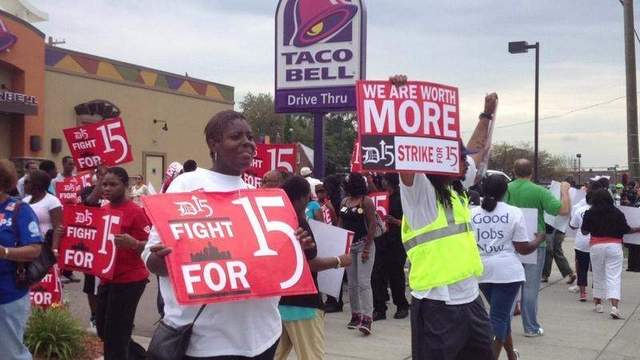 (Fast-food workers walk out on July 30 in Detroit | Source: Detroit Free Press)
(Fast-food workers walk out on July 30 in Detroit | Source: Detroit Free Press)
Libya Moore typically spends Wednesdays at home in Pittsburgh taking care of her infant daughters. But on July 24, she found herself in a Target store, the lead singer in a dance that she dubbed the “Target Shuffle.”
The song, a play on the popular hit “Cupid Shuffle,” spoke of her struggles living on her husband’s near minimum wage paycheck. “They say I’m a slacker, and I say no…” the song goes. “I just want the justice come from my soul.”
“Now raise the living wage, now raise the living wage,” it finishes.
Moore is an activist with One Pittsburgh, an organization that, along with labor unions and civil rights groups, aims to combat economic injustice and raise the minimum wage. They aren’t alone.
| For organizers in many states, waiting for the politically polarized U.S. Congress to act is risky and a waste of time. They have instead focused their efforts state-by-state—and in some cases, city-by-city. |
On July 24, the day that marked the fourth year without a minimum wage increase, 41 protests were held across the country—from a demonstration outside Congressman Andre Carson’s Indiana office to a parody “Ronald McDonald” skit performed at a Baltimore McDonald’s.
Last week, thousands of fast food workers in seven major cities—New York, Chicago, Detroit, Milwaukee, St. Louis, Kansas City and Flint, Michigan—walked out to demand that fast-food restaurants raise the minimum wage to $15 an hour.
Dovetailing the grassroots movements was President Barack Obama’s economic tour in support the middle class, in which he lambasted the growing income gap. The Miller-Harkin bill, sponsored by U.S. Reps. George Miller and Tom Harkin, would raise the federal minimum wage to $10.10 and index it to inflation.
But the fight, according to activists on the ground, has gone local.
For organizers in many states, waiting for the politically polarized U.S. Congress to act is risky and a waste of time. They have instead focused their efforts state-by-state—and in some cases, city-by-city.
“We can’t wait for Congress to act,” said Jen Kern, a spokeswoman for the Working Families Organization, an offshoot of the Working Families Party. “Historically, we’ve always seen an uptick of state activity before the federal minimum wage gets raised.”
There are currently 19 states plus the District of Columbia with minimum wages higher than the federal minimum. Next year, Connecticut and New York’s will go up. Kern predicts that around 25 states, plus D.C., will have higher-than-federal minimum wages by the end of 2014.
Among these states would be New Jersey, which has a ballot initiative on the minimum wage scheduled for this November, as well as Illinois and Maryland, both of which are close to passing bills that would push the minimum wage higher and index it to inflation.
Working Families has teamed up with Service Employees International Union, Communities United and various teachers’ unions to launch a lobbying campaign in Maryland. They have enlisted the help of the National Employment Law Project (NELP), which acts as the “research brain” behind the fight by producing original research, drafting template op-eds and creating fact sheets. The Working Families’ coalition then uses these tools to lobby legislators, testify at hearings, and inform constituents.
|
83¢ an issue is our unconscionably low introductory rate. Subscribe now! |
Working Families’ most recent work yielded hundreds of handwritten letters that are currently pinned on a wall in their Maryland office. The letters, written by constituents, will be delivered to state legislators.
“Public education and mass mobilization lead to earned media, and earned media raises pressure on politicians,” Kern said. “What this means in Maryland is for Democrats to hold together as a coalition and for Governor Martin O’Malley to come out firmly, and spend his political capital to push for an increase.”
Kern is confident she will defeat opponents like the National Restaurant Association and pass a wage increase in Maryland. But the message extends beyond the ethics of inequality, she said.
“We need to focus on the fact that the real value of the wage has actually diminished over time,” she said. “This is a fight to restore the real value of the wage as it should be.
“And a raise in the minimum wage will boost the economy,” she added. “If you raise wages for people who have no choice but to spend it, the money will be injected into the economy.”
The Economic Policy Institute estimated that GDP would increase by about $32.6 billion, resulting in 140,000 new jobs.
As for a federal increase?
“I’m crossing my fingers that the minimum wage will be a central issue in the 2014 midterm elections,” Kern said. “If it is, I think it’s likely that we’ll see a raise come 2015.”
Geng Ngarmboonanant is an undergraduate at Yale University.
Like this article? Get more free!
We’ll send you a round-up of the best of the Spectator‘s journalism and political commentary as well as special offers and information so you can take action on issues you care most about. Sign up today!





0 Comments